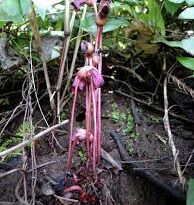26 Medicinal Health Benefits Of Bryonia (Bryonia dioica)
Bryonia, scientifically known as Bryonia dioica, is a medicinal plant that has a long history of traditional use across various cultures. Its unique properties and potential health benefits have made it a subject of interest in both traditional and modern herbal medicine.
The Botanical Description of Bryonia
1. Plant Structure: Bryonia is a climbing perennial vine characterized by its twining stems that can reach lengths of several meters. The plant’s growth habit allows it to climb and spread over other vegetation.
2. Leaves: The leaves of Bryonia are palmately lobed and heart-shaped, featuring five to seven pointed lobes. They are typically dark green and have a rough texture.
3. Flowers: Bryonia produces small, inconspicuous flowers that are typically greenish-yellow or white. These flowers are dioecious, meaning male and female flowers are found on separate plants.
4. Fruits: The fruit of Bryonia is a small, spherical berry that starts green and matures to a bright red or orange color. These berries are often referred to as “devil’s turnips.”
5. Habitat: Bryonia is native to various parts of Europe and western Asia, thriving in temperate regions with well-drained soils. It can often be found in woodland areas, hedges, and along the edges of fields.
6. Growing Season: Bryonia typically grows during the spring and summer months, producing its characteristic berries in late summer and early autumn.
7. Toxic Parts: It is important to note that Bryonia is a toxic plant, and its berries, in particular, are highly poisonous if ingested. Extreme caution should be exercised when handling or using Bryonia for any purpose.
8. Historical Uses: Throughout history, Bryonia has been used in traditional medicine for various purposes, including as a purgative, anti-inflammatory, and analgesic agent. However, its toxic nature has limited its medicinal use, and it is primarily used in homeopathy today.
The Geographic Distribution of Bryonia (Bryonia dioica)
1. Native Range: Bryonia, scientifically known as Bryonia dioica, is native to various regions of Europe and western Asia. It thrives in temperate climates.
2. European Presence: Bryonia can be found in several European countries, including France, Spain, Italy, Germany, and the United Kingdom. It is well-established in these regions.
3. Western Asian Range: In western Asia, Bryonia is present in countries such as Turkey, Iran, and parts of the Caucasus region. It is adapted to the climatic conditions of these areas.
4. Preferred Habitats: Bryonia tends to grow in woodland areas, forest edges, and along the margins of fields. It prefers well-drained soils and can often be found climbing over other vegetation.
5. Climatic Requirements: This plant species thrives in temperate climates with moderate rainfall. It is well-suited to regions with distinct seasons.
6. Distribution Challenges: Bryonia is not evenly distributed throughout its range and may be more common in certain areas while less so in others. Its presence can also vary depending on local environmental factors.
The Chemical Composition of Bryonia (Bryonia dioica)
1. Toxic Compounds: Bryonia is primarily known for its toxic nature. The plant contains toxic compounds, including cucurbitacins and alkaloids, which are responsible for its poisonous properties.
2. Cucurbitacins: Cucurbitacins are bitter-tasting compounds found in Bryonia. They are highly toxic and can cause severe gastrointestinal distress if ingested.
3. Alkaloids: Bryonia also contains alkaloids, which contribute to its toxic effects. These alkaloids can affect the nervous system and have harmful effects on the body.
4. Other Constituents: While Bryonia’s toxic components are the most well-known, the plant may also contain other compounds, although they are present in smaller quantities.
5. Homeopathic Use: Despite its toxicity, Bryonia has a place in homeopathic medicine, where highly diluted preparations are used to treat specific conditions. Homeopathic remedies are prepared using a process that dilutes the toxic compounds to a safe level.
The Harvesting and Processing of Bryonia (Bryonia dioica)
1. Harvesting Precautions: Due to its toxic nature, harvesting Bryonia should be approached with extreme caution. Harvesters should wear protective clothing and gloves to avoid direct contact with the plant.
2. Timing: The timing of harvesting Bryonia is crucial. It is typically done when the plant is in its vegetative stage and before it produces berries, as the berries are the most toxic part.
3. Extraction: For certain homeopathic preparations, Bryonia is processed using a specific dilution process to reduce its toxicity while retaining its potential medicinal properties.
4. Safety Measures: Safety measures are paramount when handling Bryonia for any purpose. It is not recommended for self-harvesting and preparation due to its high toxicity. Homeopathic preparations should only be obtained from reputable sources.
5. Traditional Uses: In traditional herbal medicine, Bryonia was used sparingly and with great caution, primarily as a purgative or for its potential anti-inflammatory effects.
6. Modern Practices: In modern herbal medicine, Bryonia is not commonly used due to its extreme toxicity. It is considered unsafe for use without specialized knowledge and preparation methods.
Read Also: 3 Ways To Improve the Tilapia Farming Profit Margin
The Medicinal Health Benefits of Bryonia (Bryonia dioica)

Bryonia, scientifically known as Bryonia dioica, has a history of traditional use for various medicinal purposes, despite its toxic nature. Here are 26 potential medicinal health benefits associated with Bryonia:
1. Anti-Inflammatory Properties: Bryonia may offer anti-inflammatory effects, potentially beneficial for conditions involving inflammation.
2. Pain Relief: It is traditionally used as an analgesic, providing relief from pain, particularly in joint and muscle pain.
3. Fever Reduction: Bryonia has been used to reduce fever symptoms in some traditional practices.
4. Respiratory Health: It may help alleviate respiratory conditions like coughs and bronchitis due to its expectorant properties.
5. Digestive Aid: Bryonia has been used to relieve gastrointestinal discomfort and aid digestion.
6. Skin Conditions: In traditional remedies, it is employed for the treatment of certain skin conditions.
7. Antispasmodic Effects: Bryonia may have antispasmodic properties, useful for reducing muscle spasms.
8. Arthritis Relief: Some traditional uses involve Bryonia for managing arthritis symptoms.
9. Laxative: It has been used as a mild laxative to promote bowel movements.
10. Cough Suppressant: Bryonia has been used as a cough suppressant in traditional remedies.
11. Anti-Rheumatic: It may help alleviate symptoms of rheumatism and related conditions.
12. Sedative: In traditional practices, it has been used as a sedative to promote relaxation.
13. Diuretic Effect: It may promote diuresis and help remove excess fluids from the body.
14. Anti-Helminthic: Bryonia has been traditionally used to combat intestinal worms.
15. Menstrual Pain Relief: Some traditional remedies employ it for relieving menstrual pain.
16. Nausea and Vomiting: Bryonia may help reduce nausea and vomiting in certain situations.
17. Promotes Sweating: It has been used to induce sweating, aiding in detoxification.
18. Detoxification: Bryonia has been employed for detoxification purposes in traditional practices.
19. Respiratory Allergy Relief: In some cultures, it has been used to alleviate symptoms of respiratory allergies.
20. Anti-Arthritic Effects: Bryonia has been used to alleviate symptoms of arthritis and joint pain.
21. Anxiety Reduction: It has been traditionally used to reduce anxiety and stress.
22. Asthma Management: In traditional remedies, it has been used for managing asthma symptoms.
23. Skin Hydration: Extracts can be used in skincare products for hydration and soothing.
24. Antifungal Effects: It may exhibit antifungal properties, useful against fungal infections.
25. Antioxidant Benefits: Despite its toxic nature, it contains some antioxidants, which can combat oxidative stress.
26. Homeopathic Use: Highly diluted homeopathic preparations of Bryonia are used for specific conditions in homeopathy.
Methods of Usage to Achieve the Provided Health Benefits of Bryonia (Bryonia dioica)
To harness the potential health benefits of Bryonia, various methods of usage can be employed:
1. Homeopathic Preparations: Highly diluted homeopathic remedies of Bryonia are available for specific conditions. These should be obtained from qualified homeopaths.
2. Traditional Herbal Remedies: In some traditional herbal medicine practices, Bryonia may be used sparingly in carefully prepared herbal formulas under the guidance of experienced herbalists.
3. Topical Applications: For certain skin conditions or pain relief, Bryonia extracts can be applied topically in the form of ointments or poultices.
4. Oral Consumption: In traditional practices, Bryonia may be consumed as a tea or tincture. However, this should be done with extreme caution due to its toxicity.
5. Modern Herbal Medicine: In modern herbal medicine, Bryonia is not commonly used due to its toxic nature. Safer alternatives are preferred.
The Side Effects of Using Bryonia Medicinal Plant
While Bryonia may offer medicinal benefits, it is crucial to be aware of its potential side effects:
1. Toxicity: Bryonia is highly toxic, particularly its berries and roots. Ingesting any part of the plant can lead to severe poisoning.
2. Gastrointestinal Distress: Consumption of Bryonia can cause severe gastrointestinal symptoms, including vomiting, diarrhea, and abdominal pain.
3. Nausea and Vomiting: Nausea and vomiting are common symptoms of Bryonia poisoning.
4. Neurological Effects: Ingesting Bryonia can lead to neurological symptoms such as dizziness, confusion, and seizures.
5. Organ Damage: Severe poisoning can result in organ damage, particularly to the liver and kidneys.
6. Cardiovascular Effects: In rare cases, Bryonia poisoning may lead to heart problems.
7. Respiratory Distress: Bryonia poisoning can cause respiratory distress, leading to difficulty breathing.
8. Death: Ingesting a sufficient quantity of Bryonia can be fatal, particularly in children and pets.
Read Also: 21 Medicinal Health Benefits Of Diospyros seychellarum (Seychelles Ebony)
The Scientific Research and Studies of Bryonia (Bryonia dioica)

Scientific research and studies on Bryonia (Bryonia dioica) have explored various aspects of its properties and potential effects. Here are 11 findings from scientific investigations:
1. Anti-Inflammatory Activity: Studies have indicated that Bryonia may possess anti-inflammatory properties, which could be valuable for conditions involving inflammation.
2. Cucurbitacins and Toxicity: Research has focused on the toxic compounds in Bryonia, particularly cucurbitacins, and their effects on the human body.
3. Traditional Use Validation: Some studies have sought to validate the traditional uses of Bryonia in herbal medicine.
4. Homeopathic Applications: Scientific investigations have explored the efficacy and safety of highly diluted homeopathic preparations of Bryonia for specific health conditions.
5. Toxicology Studies: There have been toxicological studies assessing the potential risks associated with Bryonia consumption.
6. Neurological Effects: Research has examined the neurological effects of Bryonia poisoning and potential treatments.
7. Gastrointestinal Effects: Studies have investigated the impact of Bryonia on the gastrointestinal system and the mechanisms of toxicity.
8. Antioxidant Properties: Some research has explored the presence of antioxidants in Bryonia, despite its toxicity.
9. Case Studies: Scientific literature includes case studies of individuals who have experienced Bryonia poisoning, providing insights into its effects.
10. Animal Studies: Animal studies have been conducted to understand the toxic effects of Bryonia and potential antidotes.
11. Safety and Regulations: Research has contributed to the development of safety guidelines and regulations regarding the use of Bryonia in herbal products and homeopathic preparations.
Safety Precautions and Recommendations in Using Bryonia (Bryonia dioica) Medicinal Plant
Safety is paramount when considering the use of Bryonia for any purpose. Here are essential safety precautions and recommendations:
1. Avoid Self-Harvesting: Due to its extreme toxicity, never attempt to harvest Bryonia or prepare remedies without specialized knowledge and training.
2. Homeopathic Use: If considering Bryonia for homeopathic purposes, consult a qualified homeopath who can provide highly diluted preparations tailored to specific health conditions.
3. Medical Guidance: Always seek guidance from a healthcare professional or herbalist with expertise in the safe use of toxic plants like Bryonia.
4. Keep Out of Reach: Keep Bryonia plants, extracts, or preparations out of the reach of children and pets due to their extreme toxicity.
5. Labeling: Ensure that any Bryonia-based products are properly labeled and clearly indicate their contents and usage instructions.
6. Dosage: Follow recommended dosage guidelines strictly, if provided by a qualified healthcare professional or homeopath.
7. Adverse Effects: Be aware of potential adverse effects and seek immediate medical attention if any signs of poisoning occur.
8. Storage: Store Bryonia-based products securely in a place inaccessible to children and pets. Follow storage recommendations on product labels.
9. Allergies: Perform an allergy test before using Bryonia preparations, especially if you have a history of plant allergies.
10. Pregnancy and Nursing: Pregnant or nursing individuals should avoid Bryonia due to its toxicity.
11. Reporting Poisoning: In case of accidental ingestion or poisoning, contact a poison control center or seek immediate medical attention.
12. Local Regulations: Comply with local regulations regarding the sale and use of toxic plants and herbal preparations.
FAQs About Bryonia (Bryonia dioica) Medicinal Plant
1. Is Bryonia safe for self-harvesting and use in home remedies?
No, Bryonia is extremely toxic, and self-harvesting or preparing remedies is strongly discouraged.
2. Can Bryonia be used in traditional herbal medicine practices?
Bryonia has been used traditionally but sparingly and with great caution due to its toxicity.
3. What are the signs of Bryonia poisoning?
Signs of poisoning can include gastrointestinal distress, nausea, vomiting, dizziness, confusion, and seizures. Severe cases can lead to organ damage and even death.
4. Is there any safe usage of Bryonia for medicinal purposes?
Highly diluted homeopathic preparations may be considered safe for specific conditions when obtained from qualified homeopaths.
5. Can Bryonia be used during pregnancy or while nursing?
Bryonia should be avoided during pregnancy and nursing due to its toxicity.
6. Are there any antidotes for Bryonia poisoning?
Treatment for Bryonia poisoning is mainly supportive, focusing on managing symptoms. Consult a healthcare provider immediately if poisoning is suspected.
7. Can Bryonia be used to treat arthritis or joint pain?
While traditionally used for such purposes, Bryonia’s extreme toxicity makes it an unsafe choice. Safer alternatives should be considered.
8. How should Bryonia-based products be stored to prevent accidental poisoning?
Store them securely out of the reach of children and pets, following the storage recommendations on product labels.
9. Are there any known interactions between Bryonia and medications?
Due to its toxicity, there is limited
information on interactions. However, it is advisable to consult a healthcare provider before using Bryonia alongside medications.
10. Is Bryonia regulated by any health authorities?
Regulations may vary by region, but it is generally considered unsafe for use in over-the-counter products.
11. Can animals be affected by Bryonia poisoning?
Yes, pets and livestock can also be affected by Bryonia poisoning if they ingest the plant. Seek immediate veterinary attention if poisoning is suspected in animals
.
12. Is it safe to handle Bryonia plants without protective gear?
No, handling Bryonia plants without protective gear is not safe, as even contact with the plant’s sap can lead to skin irritation.
13. Can Bryonia be used to treat respiratory allergies?
While it has been used traditionally for such purposes, its extreme toxicity makes it an unsafe choice. Consult a healthcare provider for safer alternatives.
14. Are there any traditional rituals associated with Bryonia use?
Some cultures have incorporated Bryonia into traditional rituals for specific purposes, but these practices vary widely.
15. Can Bryonia be grown as an ornamental plant in gardens?
Growing Bryonia as an ornamental plant is not recommended due to its extreme toxicity, which poses risks to humans and pets.
16. Is there any ongoing research into safer uses of Bryonia?
Research into safer applications of Bryonia is limited due to its toxicity. Safer alternatives are often preferred in modern herbal medicine.
17. Can Bryonia be used to treat fever?
Traditional uses have included Bryonia for reducing fever symptoms, but it is not a recommended treatment due to its toxicity.
18. Can Bryonia be found in the wild in North America?
Bryonia is not native to North America, and its presence in the wild is limited primarily to Europe and western Asia.
19. What are the first aid measures for Bryonia poisoning?
In case of Bryonia poisoning, seek immediate medical attention. There are no specific first aid measures, and treatment is primarily supportive.
20. Are there any known cases of Bryonia poisoning in recent times?
While rare, cases of Bryonia poisoning may still occur due to accidental ingestion. Prompt medical attention is crucial in such cases.
21. Can Bryonia be used for detoxification purposes?
Bryonia has been used traditionally for detoxification, but due to its toxicity, safer detox methods are recommended.
22. Can Bryonia be used for treating skin conditions like eczema or psoriasis?
The extreme toxicity of Bryonia makes it an unsafe choice for treating skin conditions. Consult a dermatologist for appropriate treatments.
23. Are there any warnings or precautions when using highly diluted homeopathic Bryonia preparations?
Even highly diluted homeopathic preparations should be used under the guidance of qualified homeopaths to ensure their safety and effectiveness.
24. Is Bryonia poisoning reversible with treatment?
The outcome of Bryonia poisoning varies depending on the severity of exposure and promptness of treatment. Some cases can be managed, while severe cases may lead to irreversible damage or death.
Read Also: What is Daisy Flower? Benefits, Uses and Importance









